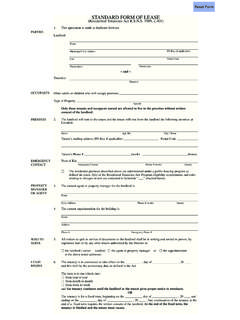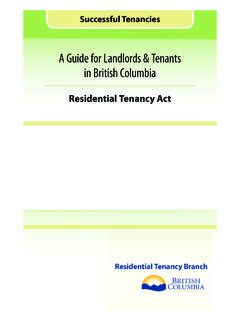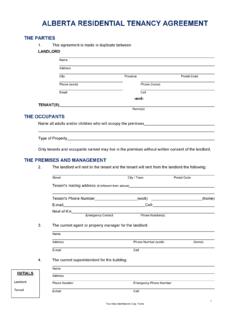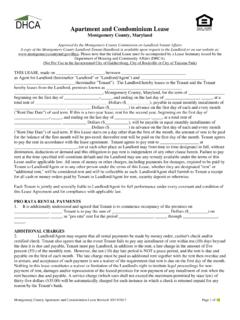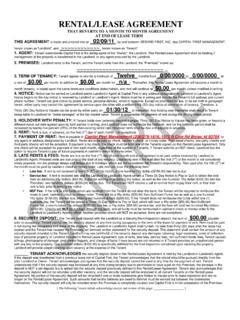Transcription of Eviction in the ACT - tenantsact.org.au
1 Unlawful Eviction , but also extends protection to lawful sub-tenants. If the landlord has consented in writing to a sub- tenancy , then the sub-tenant is protected from unlawful Eviction like any other tenant. The law does not protect occupants or unapproved sub-tenants from Eviction to the same degree. If you think you might fall into one of these categories, you should seek specific advice or see Occupancy Factsheet: Ending an Occupancy & Eviction . Eviction PROCESS A landlord seeking to terminate a tenancy must follow a strict process set out in the RTA. There is no lawful short-cut available, even where the tenant is in breach of the tenancy agreement or behind in the rent. In general, the process is: 1. Notice The landlord or agent must serve a valid, written notice to vacate on the tenant, providing the tenant with the correct period of notice applicable to the type of tenancy and grounds for termination: cl 83 (see over the page for grounds); The landlord/agent must have, and must state in the notice, one or more of the lawful grounds for termination set out in the RTA, as well as sufficient details identifying the circumstance giving rise to the grounds: cl 83(b); The notice to vacate should also specify that the landlord requires the tenant to vacate on expiry of the notice period, and that the tenancy will end on the day the tenant vacates.
2 Note that if the landlord s/agent s reason for the termination is that the tenant has breached the tenancy agreement, the landlord usually must first issue a notice to remedy before issuing the notice to vacate see page 3 Termination for breach by the tenant . 2. Order from ACAT If the tenant does not voluntarily move out of the premises after receiving valid notice, the landlord must apply to ACAT for a termination and possession order (TPO); and The tenant has the right to (and should) be present at the ACAT hearing to defend an Eviction . 3. Warrant for Eviction If ACAT has made a TPO, it can also issue a warrant for Eviction . This warrant gives the police the power to evict the tenant within a specified time if the tenant has not vacated of their own accord as directed by the TPO.
3 This leaflet outlines the Eviction process in the ACT. For details about what to do if you intend to challenge an Eviction see tenancy Factsheet: Defending an Eviction . For information about termination of tenancies by tenants see tenancy Factsheet: Ending a tenancy and Breaking a Lease. All tenancies in the ACT are regulated by the Residential Tenancies Act 1997 (RTA). The terms of your tenancy agreement are set out in the RTA and Standard Lease, and are known as the Standard tenancy Terms (STT). The landlord, or their agent, may only terminate a tenancy agreement in accordance with Part 4 of the RTA, and the STT. When can a tenant be evicted? The general effect of the legislation is to ensure that a tenant can only be evicted in the ACT if: They have breached the terms of their tenancy agreement; or The landlord has other lawful grounds for termination or reason for needing to recover the premises.
4 A landlord cannot terminate the tenancy just because the agreed fixed term has expired. When a fixed term expires it does not end the tenancy it means that the tenancy no longer has a set term, this is called a periodic tenancy . Who can evict a tenant? The landlord or agent can serve a notice to vacate however, only the ACT Civil and Administrative Tribunal (ACAT) can order an Eviction , and only the police can carry out the Eviction . An important protection given by the RTA is the prohibition in section 37 against a landlord attempting to recover possession in any other manner than that provided by the Act. Protection of sub-tenants The legislation not only protects tenants from Eviction in the ACT The police must give the tenant at least 2 days notice of the Eviction , unless there are exceptional circumstances involved.
5 GROUNDS FOR TERMINATION Listed below are the only permissible grounds for termination of the tenancy agreement, leading to Eviction : Termination of any tenancy Grounds in the RTA The RTA says that, on application by the landlord, the Tribunal (ACAT) MAY terminate a tenancy in the following situations: Where there are grounds for termination under the STT (cl 86, 94, and 96), the landlord has given the correct notice; and the tenant has not vacated (s 47); Where the tenant has breached the STT (see page 3 for details), the landlord has given the correct notice and the tenant has not vacated (ss 48-49); Where the landlord would suffer significant hardship if the tenancy continued and this hardship is greater than the hardship the tenant would suffer if it was terminated (s 50); Where the tenant has caused or permitted serious damage to the property of the landlord, or injury to the landlord or a member of their family (s 51); Where the agreement was induced by a false or misleading statement of the tenant (s 52); Where the tenancy agreement was part of a contract of employment, the tenant has ceased working and the premises are required to house another employee (s 53); Where the tenant has repudiated the tenancy agreement, the landlord accepted this, and the tenant has failed to vacate (s 55).
6 Repudiation means to indicate that you no longer wish to be bound by the tenancy agreement; or Where the tenant has sublet the premises without written permission (s 54). Grounds in the tenancy Agreement Clause 86 Termination where premises are unfit for habitation Under cl86 either party may give written notice to terminate the tenancy if the premises are unfit for habitation, or are not available due to government action. The tenant must give 2 days notice, and the landlord at least 1 week (cl 87). Posting Clauses Some tenancy agreements also contain a special term known as a posting clause that provides an additional ground for termination on 4 weeks notice where a party (either the landlord or the tenant) is being posted to or away from the ACT in the course of their employment (s 8).
7 Termination of a periodic tenancy As well as the above grounds, in a periodic tenancy (after the fixed term of the tenancy has ended, or where there is no fixed term) there is additional scope for the landlord to terminate the tenancy . The landlord may terminate a periodic tenancy where there are grounds set out in cl 96, or by issuing a no cause notice to vacate: cl 94. Clause 96 STT Termination with cause Cl96 sets out the grounds for termination and the period of notice the landlord must give, as follows: That the landlord or their immediate relative, or a person who has a close personal relationship, and a reasonable expectation that the landlord would provide them with accommodation, genuinely intends to live in the premises (cl 96(1)(a),(b) and (c)) [4 weeks notice]; That the landlord has a genuine intention to sell the premises (cl 96(1)(d)) [8 weeks notice]; or That the landlord has a genuine intention to reconstruct, renovate or make major repairs that cannot reasonably be carried out with the tenant living in the premises (cl 96(1)(e)) [12 weeks notice].
8 A notice under cl 96 can only be issued when the tenancy is periodic. This means such a notice cannot be given to a tenant who is in a fixed term tenancy . However, such a notice can be served once the fixed term expires and the tenancy becomes periodic. Clause 94 STT - Termination without cause A landlord is able to terminate a tenancy without providing a cause. However, this may only occur where: (a) 26 weeks notice is given; and (c) the notice does not require the tenant to vacate during a fixed term. A notice under cl 94 can be issued at any time (even during a fixed term tenancy ), as long as the date for vacation is after the fixed term has expired. Where cl94 or cl96 are used, the tenant may vacate at any time during the 2 weeks prior to the date for vacation on the landlord s notice, as long as the tenant gives 4 days notice to the landlord (cl 95, cl 97).
9 Also, under cl88 the tenant can give their own 3 weeks written notice of intention to vacate at any time during a periodic tenancy . TERMINATION FOR A BREACH BY THE TENANT When a landlord or agent wants to terminate a tenancy and have the tenant vacate the property for a breach of the tenancy agreement they must have valid grounds and they must follow the processes set out in the STT. Failure to pay rent clause 92 If rent goes unpaid for 7 days (this includes only paying part of the rent), on the 8th day the landlord may serve a Notice to Remedy (NTR). This must say if the outstanding rent is paid within the next 7 days, no further action will be taken and the tenancy will continue. If the rent is not paid within that 7 days, a Notice to Vacate (NTV) may be served, giving the tenant 14 days to move out.
10 At this time the landlord can also make an application for a TPO to ACAT. However the ACAT hearing cannot take place until the date for vacation specified in the NTV has passed. Where 2 previous notices to remedy have been served for rent arrears during a tenancy , and there is a failure to pay rent the landlord may serve a notice to vacate one week after the day on which the rent is due without first serving the notice to remedy. Other breaches clause 93 For other breaches that are serious enough to justify terminating the tenancy the landlord must give a notice to the tenant to remedy the breach within 14 days, if it is capable of remedy. If the breach is not remedied within that time, or is incapable of being remedied, a notice to vacate within 14 days can be served.
